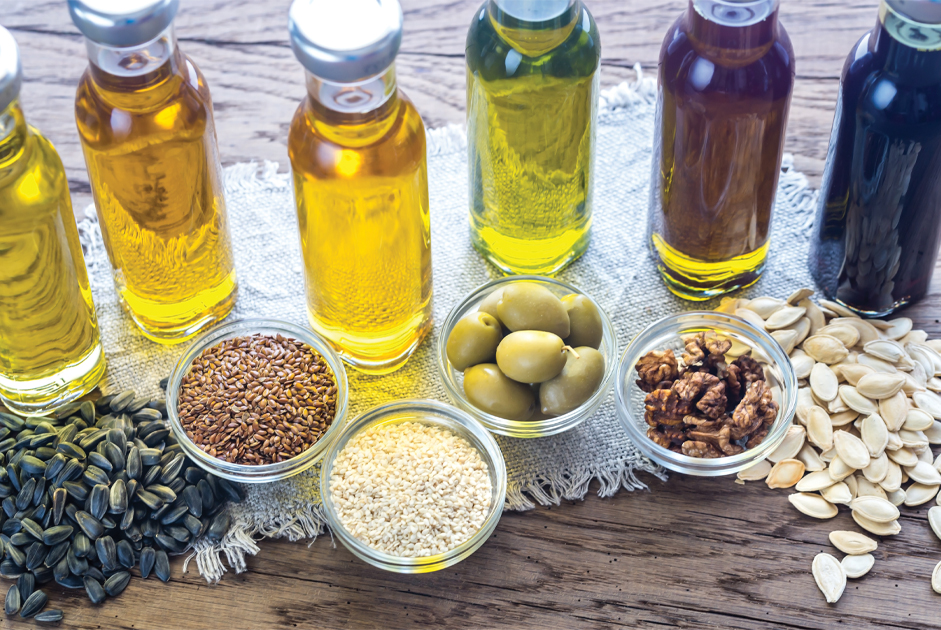Oils are great sources of fat, and fat is a great source for energy. Fat is also responsible for many necessary body functions, like protecting the brain and other vital organs, and it’s essential for your body to absorb vitamins that are fat soluble. Fat can even help you maintain healthy cholesterol levels. That last part sounds counterintuitive doesn’t it? Because we have been told to eat less fat in order to have good heart health but it’s only bad fat that’s bad for you and when you mix bad fat with refined carbs, you have a recipe for heart disease!
When we choose what oils to cook, marinate and dress with, we want to focus on some and steer clear of some others. Some of these may sound healthy and be all the rage, while really, when you look at their ratios and what kind of fats they are, you will pass them by in the store and leave them where they belong: on the shelf.
Seed oils are typically the worst of oils. Cottonseed, grapeseed, safflower, sunflower – these are all obvious seed oils but some that you might not think of as seed oils are corn, canola, rice bran and soy. The majority of these used in foods will be refined oils, using high heat to process them. Even when they are cold pressed and unrefined, they still contain high polyunsaturated fats, and this is where they create havoc in the body. When we consume them, the oils spout off free radicals and produce excess inflammation – the Omega 6 part of oil is pro-inflammation. This doesn’t mean that seeds are bad for you in whole or ground form. Seeds are great when they aren’t processed into oil, so enjoy your sunflower seeds in the shell at the baseball game.
The free radicals and inflammation can have some unfavorable effects on your body. Brain fog, mood swings, and headaches can all contribute to excess free radicals in the body. The inflammation can reduce your overall circulation, creating a host of issues in the body like reducing your body’s ability to heal whatever ails you, reducing brain function, excess body weight and increasing your risk of heart disease and a host of cancers.
Coconut oil is a great oil for your skin, but it’s better left to skincare than using it in the kitchen. Coconut oil is 98% saturated fat (the bad fat). Palm oil is an oil we see in the ingredients list in an array of foods. From Valentine’s Day chocolates to peanut butter, it’s everywhere. The palm oil ingredient we see on food packaging is going to be refined palm oil and that is where the benefit of unrefined palm oil is lost and we put palm oil on the “watch out for” list since it’s very high in palmitic acid and that is high in saturated fatty acid.
Let’s get to the good oils! Avocado, almond, peanut, macadamia, and olive oil. These are all heavy monounsaturated fats. This makes flaxseed oil a great oil, too, but it’s not great if you put it with heat. It’s a better one for dressings in the kitchen which means it doesn’t make my shopping list because I need oils that are multifunctional, good for cooking, skin care, and dressings!
Our good oils are loaded with Omega 3s, the anti-inflammatory omega, and they are loaded with HDL, the good cholesterol that picks up the excess LDL in your system and moves it to your liver, which breaks it down and kicks it to the curb. Your brain loves Omega 3 rich oils as it feeds your cognitive function and keeps the brain healthy – because your brain is 60% fat!
A good shopping tip when selecting your olive oils, is to look for oils that have a stamped harvest date. Olive oil can go rancid if it sits for too long. Most extra virgin olive oil is good on a shelf for two years and it should be purchased within one year after harvest date; once it’s opened you want to use it up within six months. Choosing one that’s in a dark glass will keep the light out and keeping it in a cabinet away from sunlight is best when storing it at home.
Avocado oil is a great choice for cooking because it has a high temperature smoke point, higher than olive oil. If your dish calls for a sauté pan set on medium-high or high, this is a great choice to ensure you don’t set off any smoke alarms! It’s high in Omega 3 oils and has a very low saturated fat content. It’s also loaded with Vitamin A and E and it’s an oil for feeding your skin and hair!
An easy way to add some good, healthy fat to your daily diet is to just add in a small amount of oil to your meals. Use it as a base for meats when adding herbs and spice, add some when cooking your sauteed veggies, use it to make a salad dressing. Small but mighty changes!






















